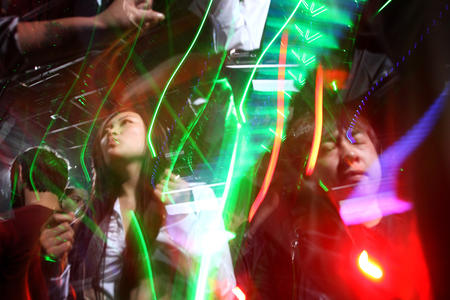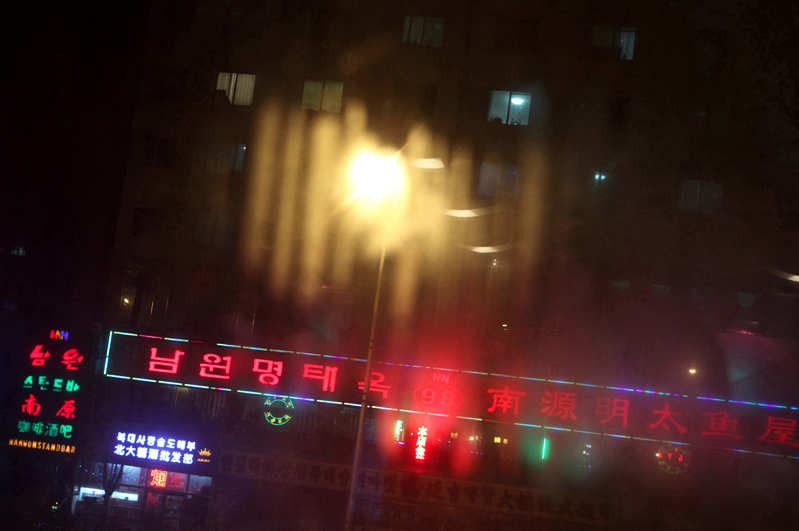
In Yanji, China cross-border politics and a sense of hopelessness fuel a growing meth addiction.
Yanji is a desolate city 50 miles from the river border between China and North Korea. With its Stalinist architecture and tile-clad buildings, it could be Anywhere, China. But on closer inspection, cross-border influence is signaled by the Korean-language signs, Korean coffee shops, and Korean karaoke bars that are dotted around the city. It is a place that is home to refugees, smugglers, prostitutes, opportunists, and evangelical Christians in the market for lost souls.
Over the past decade and a half, methamphetamine—known colloquially as crystal meth or ice because of its flaky crystals—has flooded Yanji and the wider Jilin province, fueled by an underground economy, border transients, and the general poverty and desperation of the region.
Twenty years ago, Yanji had only 44 registered drug addicts. Last year, the city registered almost 2,100 drug addicts, according to a 2010 Brookings Institution report, with more than 90 percent of them addicted to meth or similar synthetic drugs. Local officials acknowledge that this is very likely a gross undercount and that the actual number may be five or six times higher. "Jilin Province is not only the most important transshipment point for drugs from North Korea into China, but has itself become one of the largest markets in China for amphetamine-type stimulants," the Brookings report said.
Chinese authorities recently conducted a provincewide crackdown, code-named Strong Wind. But for law enforcement, the drug presents a particular problem. Unlike other drugs, it's nearly impossible to trace the origin of meth. Still, officials, residents, and experts believe that much of the methamphetamine consumed in this Chinese region is manufactured across the border in North Korea, a longtime exporter of drugs. "Clearly," the Brookings report said, amphetamine-type stimulants "from North Korea have become a threat to China in recent years."
In an article published last year, Cui Junyong, a professor at Yanbian University's School of Law, posited that a large amount of the illegal drugs ingested in Yanji came from North Korea. Supporting his point, the border patrol last year arrested six North Koreans in a high-profile bust, including a dealer named "Sister Kim." Although sources estimate that a gram of meth in North Korea costs roughly 10 times the price of a kilo of rice—about $15—it's still much cheaper than in China.
"Selling ice is the easiest way to make money," says Shin Dong Hyuk, who was born in a North Korean concentration camp in 1982 and escaped to South Korea in 2005. Every defector, he added, "knows about ice."
Perhaps because of its alliance with its benighted neighbor, the Chinese government has been extremely careful about pointing its finger at North Korea; reports on drug busts in Jilin province euphemistically refer to the drugs as coming from a "border country."
"We don't publicize" the drugs coming from North Korea because it would touch on "the good relationship between China and North Korea," an official, requesting anonymity, from Jilin's anti-drug unit says. But he adds, "Of all the drugs we've seized this year, it's mostly been ice, because that's our main drug here."
Meth is relatively simple to manufacture, both in terms of the chemicals and space needed. And in many ways North Korea, a mountainous and isolated country littered with abandoned factories, is the perfect place to cook the toxic fumes. Yun Minwoo, a criminologist and assistant professor at Hansei University in South Korea, compares North Korea to Bulgaria and Romania, countries where even the highly educated are unable to earn a sufficient income.
According to Yun and others, North Korea's methamphetamine production is centered in Hamheung, the site of a chemical-industrial complex built by the Japanese during World War II, which has a high concentration of chemists and was reportedly one of the worst-hit cities during the famine.
First synthesized in 1893, meth is now one of the world's most widely abused drugs, imbuing the user with intense feelings of euphoria, concentration, and grandiosity. Smoked, injected or snorted, the drug also suppresses the need for food and sleep for an extended period of time; coming down can bring fatigue, anxiety, and occasionally suicidal ideation.
Inside North Korea, observers say, many use meth in place of expensive and hard-to-obtain medicine. "People with chronic disease take it until they're addicted," says one worker for a South Korea-based NGO, who requested anonymity in order to avoid jeopardizing his work with defectors. "They take it for things like cancer. This drug is their sole form of medication," says the NGO worker, who has interviewed hundreds of defectors in the past three years. A former bicycle smuggler who defected in 2009 told Newsweek of seeing a doctor administering meth to a friend's sick father. "He took it and could speak well and move his hand again five minutes later. Because of this kind of effect, elderly people really took to this medicine."
Jiro Ishimaru, founder and editor of Rimjin-gang, a magazine about North Korea and reported by people inside the country but published in Japan, says he has seen several North Koreans take meth to relieve stress and fatigue, including his former North Korean business partner. "He didn't start taking it as a drug but as a medicine," Ishimaru says.
The drug also offers an escape that might not otherwise be possible. As Shin puts it: "There's so little hope in North Korea—that's why ice is becoming popular. People have given up."
Given the country's isolation, estimates for the percentage of the population using the drug in North Korea are speculative. The sensitivity of speaking about drugs, and the political sensitivity involved with trafficking to China, muddies the picture further, especially because North Koreans, even defectors, don't want to embarrass their country by speaking about something as shameful as addiction.
One defector recounted, however, how she had only recently found out her uncle had died doing meth two years ago. "He was the same person who sold our house when we were out in China without us knowing about it. Maybe he needed the money," she said. And a man, who spent nine years living on the streets of North Korea, admitted trying heroin once while living in a garbage dump. "Ice is for the wealthy," he said.
North Korea has a long history of state-sponsored trafficking, with diplomats smuggling contraband including gems, cigarettes, and fake U.S. $100 bills. During the late 1970s, the state got into opium growing. Shin, who is the only known escapee from a North Korean concentration camp, says guards at the camp assigned prisoners to attend to the crop. "Inside the camp, there were always people who planted the poppy seeds near me or around me. It was a farm. The seeds were planted beside plots of vegetables."
A former school principal in North Pyongan province interviewed by Newsweek says that, on government orders, he directed his students to plant opium from 1984 to 1991. "Throughout the country, schools were given plots of land to grow opium on. The stuff the government owned they secretly sent out of the country." The teacher says that, during harvest, students would steal part of the crop to sell.
With the fall of the Soviet Union in 1991, billions of dollars in aid that helped prop up the North Korean economy vanished, leading to a devastating famine that killed more than a million people and forced tens of thousands of North Koreans to flee across the border into cities such as Yanji. Sheena Chestnut, an expert on North Korean trafficking, says some refugees carried drugs with them to sell or to barter for food, fueling an expansion of the drug trade. (Today, more than a third of North Korean defectors imprisoned in the South have been convicted on drug charges, according to The Korea Herald.)
A 2008 report to Congress stated that "strong indications exist that the North Korean … regime has been involved in the production and trafficking of illicit drugs." The report went on to cite 50 documented drug-trafficking incidents during the last couple of decades, "many involving arrest or detention of North Korean diplomats."
An International Narcotics Control Strategy Report to Congress this year, however, found that, two years later, there were "no confirmed instances of large-scale drug trafficking" involving the North Korean regime, and some experts think the trade has shifted to smaller—private—traffickers carrying the drug across the river. The North Korean government has seemingly tried to curtail the drug use. Local officials last year announced an anti-drug campaign, saying "all carrying the drug, sellers, and users will be severely punished by the law," according to theDaily NK, a Seoul-based newspaper. And several sources told Newsweek that anti-drug posters have gone up in the capital Pyongyang, a rare admission of a societal ill in a place where the state rarely admits problems. But one defector, whose brother in North Korea is addicted to meth, is skeptical of the government's intentions. "They don't give us rice or rations," she says. "Do you think they're going to do anything about drugs?"




